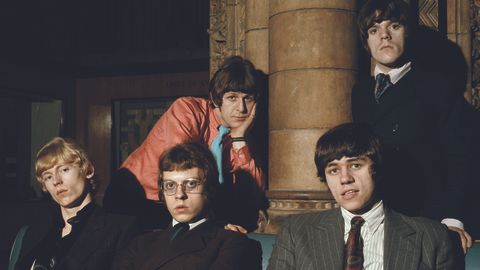It was a certain David Bowie who in late 1965 persuaded future Move drummer Bev Bevan to get together the best musicians in Birmingham and “rehearse like crazy until you’re as tight as a drum. Go to London, find a manager and get a record deal,” Bowie advised him.
Five years on, Bowie recorded The Man Who Sold The World armed with a copy of The Move’s second album, ‘Shazam’, which covered the Barry Mann/Cynthis Weill song Don’t Make My Baby Blue. The latter’s sky-climbing guitar riffs became the blueprint for Bowie’s own Black Country Rock and Width Of A Circle. Touché.
Yet The Move never get their dues. Wildly eclectic, they tend to be relegated to cult margins, whereas Roy Wood, Carl Wayne, Ace Kefford, Trevor Burton and Bevan ought to be recognised for a contribution to the 60s/70s axis that saw pop turn to base metal.
Maybe the expanded versions of the debut (9⁄10) and ‘Shazam’ (9⁄10) will rectify this wrong. Incredibly weird and sonically threatening, The Move kicked into gear with Yellow Rainbow, sung by in-house acid casualty Kefford. Ostensibly a childlike trip into psychedelia, it was actually a paranoid look at nuclear apocalypse.
Wood specialised in borderline insanity and unhinged characters. The hit single (Here We Go Round) The Lemon Tree is a study in derangement, with a peeping tom spying on a girl in a silver bikini who is ‘round the bend’. In Walk Upon The Water a group of toffs are so out of their minds that they drive into the sea and drown, while the subject of Cherry Blossom Clinic is locked up in a sanatorium. Forever. By contrast Wood was equally adept at the lewd sexual tension of Fire Brigade, Hello Susie and Beautiful Daughter. He also dug the Dead, Love and Beach Boys, yet was never a hippie.
Roy knew how to conjure up a bad trip. Hard as nails, the individual Movers were exceptional musicians: the Burton/Bevan rhythm section still sounds like nothing else on earth. Wayne was the alpha male, 10-pints vocal guv’nor; Wood provided complex harmony and classical arrangements to keep his boys slugging. Both reissues are stuffed with live and unreleased material, including comprehensive BBC sessions that hammer home their expertise.
Always on the verge of implosion The Move were a magnificent beast. This is music that eats you for breakfast and then pisses in yer chips.


